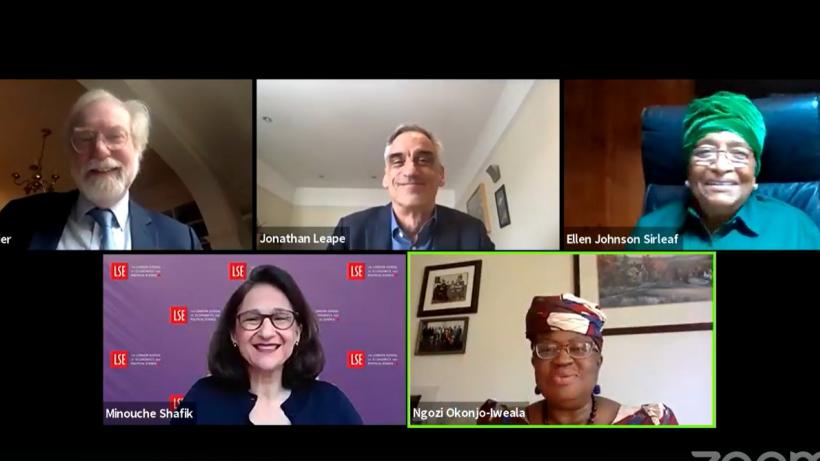
Event highlights: Global leadership to support Africa’s response to COVID-19
Part of IGC's response to addressing the economic challenges of COVID-19 in developing countries is a series of online public events that explore the role of global leadership in assisting developing countries, the economic impact of the pandemic in the Middle East, and what policy measures are needed to address the challenges facing migrant workers in India.
The first event on Wednesday, 29 April kicked off with introductory remarks from Minouche Shafik, LSE Director, and Jonathan Leape, Executive Director, IGC, who briefly discussed the IGC’s work in addressing the economic challenges of COVID-19. This includes a newly published policy guidance note signed by 37 renowned academics.
Ellen Johnson Sirleaf, former President of Liberia and co-chair of the IGC’s Council on State Fragility started the discussion by reflecting on the key lessons from the fight against Ebola that can help developing countries tackle the present pandemic.
Effective communication, capacity enhancement, and regional and global partnerships were among the main factors that contributed to eradicating Ebola in Liberia. President Sirleaf called on the global leaders to step up again and mobilise resources.
"No one is safe until everyone is safe"
According to an estimation announced by the African Union, Africa will require $130 billion to address the health and economic impacts of COVID-19. Although international organisations and multilaterals have already launched initiatives to support Africa with debt relief and health aid, more consolidated efforts are needed, said Dr Ngozi in her opening statement.
The former Nigerian Minister of Finance added that whilst a vaccine is developed, healthcare funding, mass testing and the supply of PPE equipment are critical to minimise the spread of the virus and prevent the collapse of weak healthcare systems. And as soon as a vaccine becomes available, the international community should commit to equitable distribution and ensure that all countries can benefit from it.
"Africa needs a big income injection to compensate for the income loss"
As the virus unfolds, it is still unclear what strategies might work best, but African countries should not replicate the Western model and should be more cautious when enforcing lockdowns, said Paul Collier, Professor of Economics and Public Policy at the University of Oxford and IGC Director. He added that, in his opinion, the biggest hit to Africa was not COVID-19 but the economic hit coming from the collapse of Western economies.
[Tweet deleted: https://twitter.com/afuagba/status/1255526853030404097]
The panellists explored key policy measures to strengthen health and social protection systems, the role of civil society and opportunities for African countries to learn from past mistakes.
Conclusion
COVID-19 has revealed the extent of our interconnectedness, with national and regional responses having consequences on neighbouring countries and beyond. To ensure effective global support for the most vulnerable countries, committing resources to and coordinating fiscal, monetary, and anti-protectionist initiatives are needed.
You can watch the speakers' final thoughts on how the international community can best support Africa’s response to COVID-19 below.
The podcast and video from the whole event can be found here.

